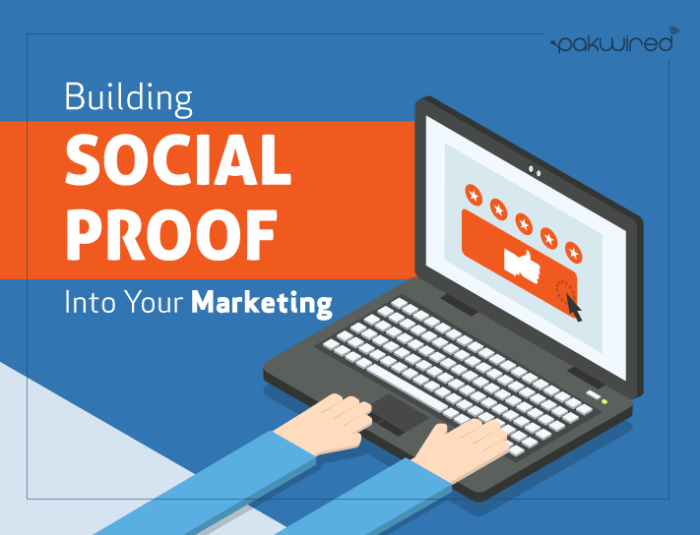Building Social Proof is all about establishing credibility and influencing consumer behavior through various types of proof like testimonials, case studies, and social media. Let’s dive into how businesses can effectively leverage social proof to boost trust and drive conversions.
What is Social Proof?

Social proof is a psychological phenomenon where people assume the actions of others in an attempt to reflect correct behavior for a given situation. It is a powerful tool in building credibility and trust, as it leverages the influence of social groups to shape individual behavior and decisions.
Examples of Social Proof
- Influencer endorsements on social media platforms, where celebrities promote products or services, leading their followers to trust and purchase the same items.
- Customer reviews and ratings on e-commerce websites influencing potential buyers to make informed decisions based on the experiences of others.
- Crowded restaurants or popular events creating a sense of urgency and desirability, prompting people to join the crowd due to the belief that others know something they don’t.
Impact of Social Proof on Consumer Behavior
Social proof significantly impacts consumer behavior by tapping into the need for validation and reassurance. When individuals see others endorsing a product or service, they are more likely to perceive it positively and feel compelled to follow suit. This phenomenon not only influences purchasing decisions but also shapes perceptions, attitudes, and preferences based on the actions of others.
Types of Social Proof: Building Social Proof
Social proof comes in various forms and can greatly influence consumer behavior. Let’s explore different types of social proof and their effectiveness in building credibility and trust.
Testimonials
Testimonials are statements from satisfied customers endorsing a product or service. They can be powerful in building trust as they provide real-life experiences. For example, a testimonial from a customer stating, “This product changed my life!” can significantly impact potential buyers.
Case Studies
Case studies showcase how a specific customer successfully used a product or service to solve a problem. They offer in-depth insights into the benefits and results achieved. For instance, a case study highlighting how a company increased its revenue by 50% after implementing a new software solution can be compelling proof of value.
Social Media Proof
Social media proof includes likes, shares, comments, and user-generated content that validate a brand’s credibility. A post with numerous likes and positive comments can create a sense of popularity and trust. For example, a tweet from a celebrity endorsing a skincare product can lead to increased sales due to their large following.
Comparison and Contrast
Each type of social proof has its strengths and weaknesses. Testimonials provide personal experiences, while case studies offer detailed results. Social media proof leverages the power of influencers and user-generated content. The effectiveness of each type depends on the target audience and the context in which it is presented.
Strategies for Building Social Proof

Building social proof is essential for businesses to establish trust and credibility with their target audience. By leveraging customer reviews, influencer collaborations, and user-generated content, businesses can effectively showcase the positive experiences of others to increase conversions and drive sales.
Leveraging Customer Reviews
Customer reviews are a powerful form of social proof that can significantly impact a consumer’s decision-making process. Encourage satisfied customers to leave reviews on your website or third-party review platforms. Highlighting positive reviews and testimonials can help build trust with potential customers and showcase the quality of your products or services.
Influencer Collaborations
Partnering with influencers in your industry can help amplify your brand’s message and reach a larger audience. Influencers have a loyal following who trust their recommendations, making them a valuable source of social proof. By collaborating with influencers who align with your brand values, you can leverage their credibility to boost your own.
User-Generated Content
User-generated content, such as customer photos, videos, and testimonials, can provide authentic social proof for your business. Encourage customers to share their experiences with your products or services on social media and other platforms. By showcasing real-life examples of satisfied customers, you can build credibility and trust with your audience.
Importance of Social Proof in Marketing
Social proof plays a crucial role in marketing campaigns as it helps to build trust and credibility with potential customers. By showcasing positive feedback and experiences from satisfied customers, businesses can influence the purchasing decisions of others. Here’s why social proof is essential in marketing:
Enhancing Brand Reputation and Credibility
- Social proof helps to establish a positive reputation for a brand by highlighting the satisfaction of existing customers.
- Positive reviews, testimonials, and user-generated content can boost credibility and trustworthiness in the eyes of consumers.
- When potential customers see that others have had a positive experience with a brand, they are more likely to trust and choose that brand over competitors.
Integrating Social Proof into Marketing Strategies
- Include customer testimonials on your website and in marketing materials to showcase real experiences and feedback.
- Utilize social media platforms to share user-generated content, reviews, and endorsements to reach a wider audience.
- Create case studies or success stories to demonstrate how your products or services have helped customers achieve their goals.
- Showcase social proof in the form of influencer partnerships, celebrity endorsements, or industry awards to further enhance credibility.
Tools and Platforms for Social Proof
To effectively showcase social proof, businesses can leverage various tools and platforms that help in highlighting positive feedback, testimonials, and user-generated content. These tools play a crucial role in building credibility and trust among potential customers.
1. TrustPilot
TrustPilot is a popular review platform that allows businesses to collect and display customer reviews. It offers features such as review invitations, review widgets, and seller ratings. By utilizing TrustPilot, businesses can showcase authentic customer feedback and ratings to establish trust with their audience.
2. Yotpo
Yotpo is a platform that specializes in collecting and leveraging user-generated content, such as reviews, photos, and Q&A. It provides tools for creating review carousels, social proof notifications, and loyalty programs. Businesses can use Yotpo to showcase real customer experiences and drive engagement.
3. ProveSource
ProveSource is a social proof platform that displays real-time notifications of recent customer activity, such as purchases, sign-ups, and reviews. It helps create a sense of urgency and FOMO (fear of missing out) among visitors. By implementing ProveSource, businesses can increase conversions and credibility.
4. FOMO, Building Social Proof
FOMO is a tool that uses social proof notifications to showcase recent customer interactions, such as product purchases and sign-ups. It creates a sense of urgency and scarcity, nudging visitors towards making a purchase. Businesses can leverage FOMO to boost sales and conversions.
5. Google Customer Reviews
Google Customer Reviews is a free tool that collects and displays reviews from verified customers. It integrates with Google Merchant Center and Google Shopping to showcase seller ratings and reviews on Google search results. By utilizing Google Customer Reviews, businesses can enhance their online reputation and visibility.





